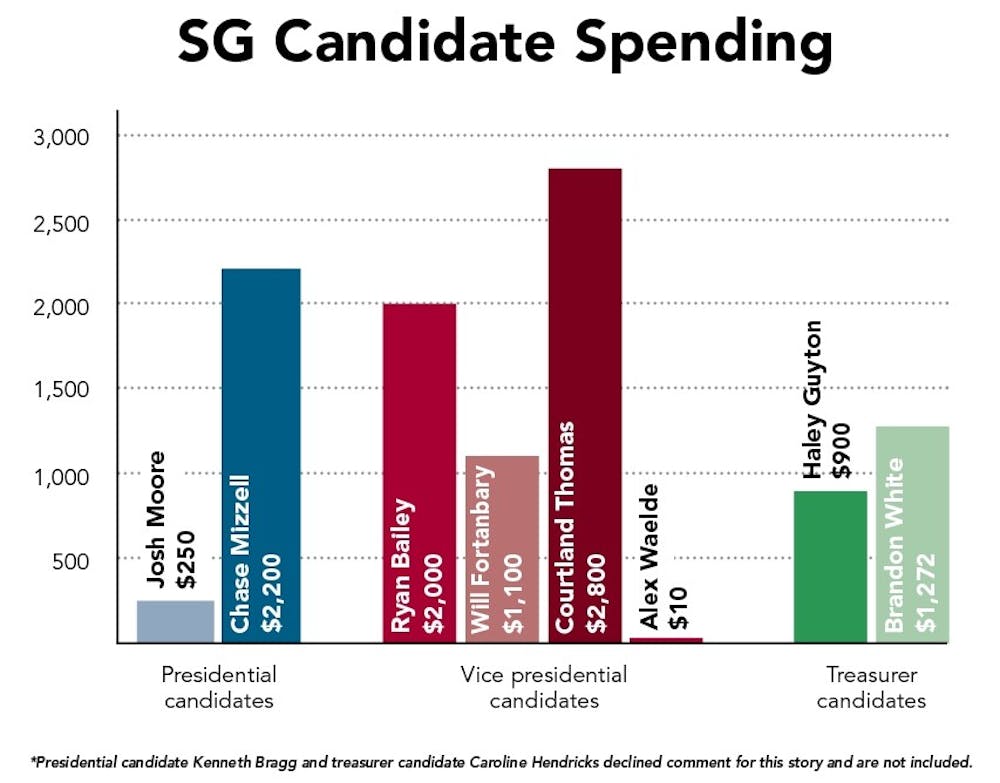Campaigns cost candidates between $10 and $2,800
Campaigning for Student Government office is no cheap feat — for most candidates, anyway.
To make their bid for office, this year’s 10 candidates for executive positions spent between $10 and 2,800, often with money from their personal accounts or from their parents, according to a survey of candidates by The Daily Gamecock.
The survey included eight of the SG candidates. Presidential candidate Kenneth Bragg and treasurer candidate Caroline Hendricks declined to comment for this story.
Courtland Thomas, a candidate for vice president, spent the most — $2,800 — including $1,000 of his savings, along with donations from friends and local businesses. That cash bought $900 of T-shirts, $700 of other promotional items and $400 for a popcorn machine, among other promotions.
Alex Waelde, who ran for vice president, spent the least — just $10 — because he only bought a domain name for the campaign.
Otherwise, he limited his advertising to his personal social media accounts, tweets from his company, DrinkingTicket’s account and messages on TV screens in two bars he co-owns in Five Points.
Waelde placed last in the vice presidential field of four last week and did not qualify for a runoff.
“It was an experiment that I thought would work but didn’t end up working that well,” he wrote in response to the survey.
The rise of social media has been one of two trends in recent years that current Student Body President Kenny Tracy said has changed the game of SG campaigning. It allows candidates to advertise for free and inundate students with their messages, he said.
“It’s been littering everyone’s (Facebook) timelines and Twitter feeds,” Tracy said.
The other game changer: In 2011, SG removed its cap on campaign spending. Previously, candidates were only allowed to spend $1,000 for the campaign and another $500 if they make it into a runoff.
While Tracy said the fundamentals of campaigning are still the same without the spending cap — it’s about building networks with organizations and students around campus, he said — the unlimited spending has allowed candidates to buy much more handouts and materials.
Without the cap, Tracy spent nearly $2,500 last year, which bought T-shirts, sunglasses and color-changing cups, he said.
This year, five of the eight candidates in the survey, including Thomas, said they spent more than $1,000:
—Ryan Bailey has spent $2,000 of his own money to run for vice president, including $800 for sunglasses he handed out to students.
—Will Fortanbary spent $1,100 in his vice presidential bid, including more than $600 from an NFL team he wouldn’t name and another $300 from his family.
—Chase Mizzell, now the president-elect, spent $2,200 on his campaign, including $200 of his own cash, after raising money from family, friends from Palmetto Boy’s State and local business owners.
—Brandon White, who ran for treasurer, spent $1,272 from his savings and stock portfolio for posters, T-shirts, chocolate coins and flowers for Greek organizations, among other expenses.
Since SG removed its spending cap, it hasn’t required candidates to file any documentation about their campaign expenses, said Meghan Aubry, the elections commissioner.
“We don’t see any of that,” Aubry said. “We don’t see any finances or anything.”
But Aubry said the elections commission still manages to keep candidates in check because it maintains “fairly strict rules” about how, when and where candidates campaign.
Still, the candidates who spent less found an uphill battle, they said.
Josh “Otter” Moore spent $250 out of pocket to fund his presidential campaign, and he focused on getting his name out with posters, candy and a sign on Greene Street he made with a shower curtain and spray paint.
Moore eventually won 11.2 percent of the vote for student body president to Mizzell’s 82.6 percent. Bragg received 6.2 percent of the vote.
“It’s tough campaigning against a guy who has T-shirts and koozies, when all you have is candy and handmade signs,” Moore wrote in the survey.
Upon their election, winning candidates will get some of that money back from the positions’ stipends.
The student body president is paid $5,320 over the academic year and summer, the vice president $4,940 and the treasurer $4,560, according to SG codes. The president also receives four football tickets per season for guests and a parking pass that’s valid across campus, said Theresa Sexton, USC’s coordinator for Student Government.
But before they get there, they run into the steep cost of campaigning, a challenge Haley Guyton knows well.
Guyton led in last week’s results for treasurer, winning her a spot in a runoff that ends today and extending her campaigning by a week.
Her parents are paying for her to campaign and told her she could spend up to $500. But after she got into the runoff, those costs kept racking up.
“$500 turned into a few hundred bucks over, and we just stopped totaling it and just started asking for the card,” Guyton said Tuesday. “Today, my mom finally said, ‘This is a lot of money.’”

